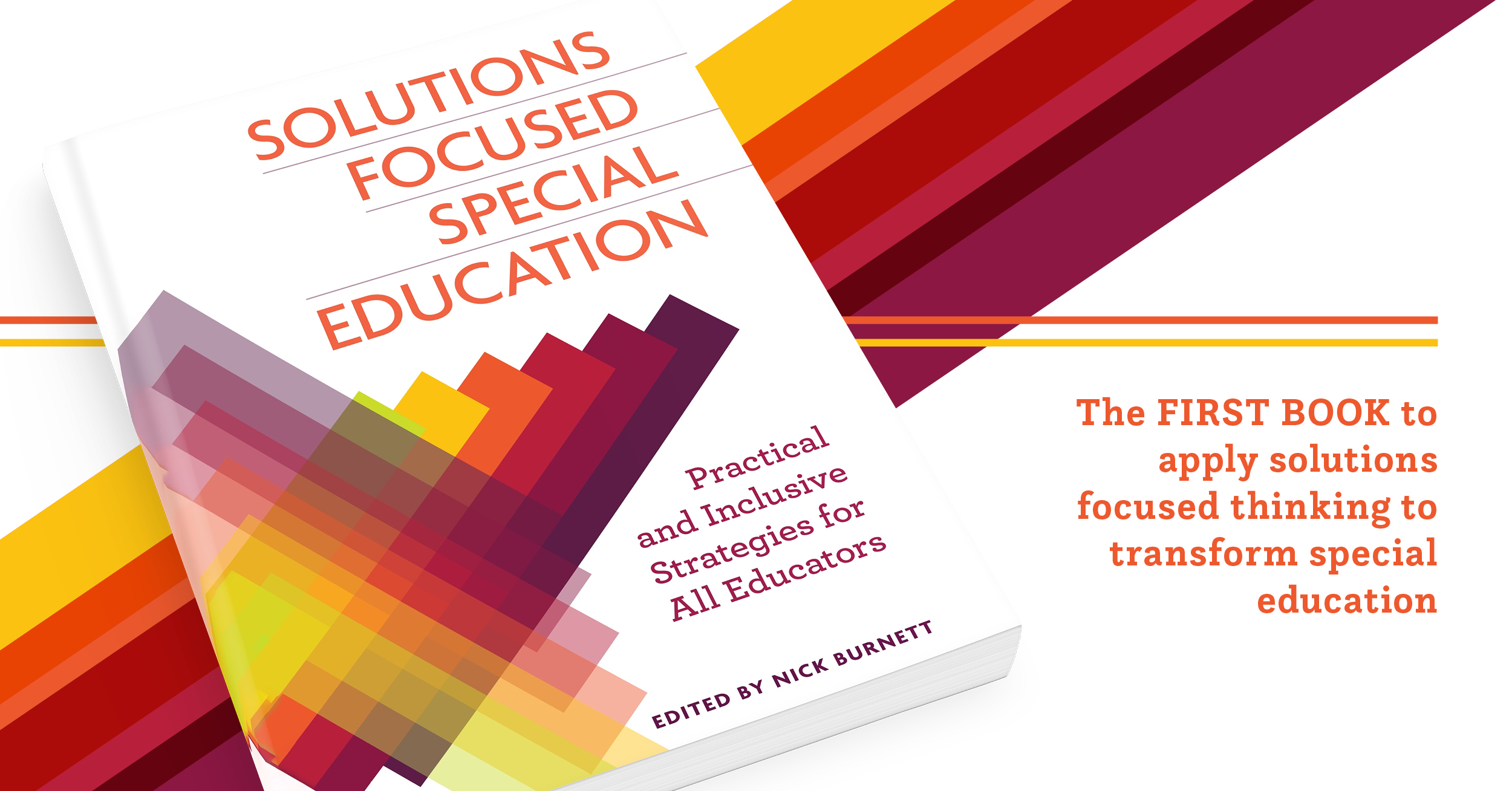‘Solutions Focused Special Education – Practical and Inclusive Strategies for All Educators’ was edited by Nick Burnett and features the work of experienced and expert contributors from across the globe.
Here is an extract from the book which details how a solutions focused approach can be a positive approach to special education:
One of the major reasons to view special education through a SF lens is that, in my view, excellent special education already has many of the key SF assumptions and principles already in place, albeit often not explicitly. Additionally, there have been ongoing discussions (arguments) in relation to inclusion and the role (or not) of special education for more than 20 years. I would suggest that now is a time to examine a different approach, particularly with the growing demand for significant changes in education as a whole. Whilst not every individual placed within special education may have ‘significant’ problems, whatever that means, I would argue that special education as a practice could be greatly enhanced by exploring it through a SF lens, and that this ‘different’ approach to viewing ‘special’ is worth exploring at both system and practitioner levels. The emphasis on ‘solutions’ afforded by the SF lens often leads to a significant shift in mindsets for people being supported and those supporting them. I would suggest the approach becomes even more person centred when working with a strength based abilities model as opposed to a problem or deficit model on which special education is currently based. It is useful to identify that there are a number of critical assumptions underpinning the adoption of a SF approach in relation to education and these are drawn from the work of de Shazer, Dolan and Korman (2007), and Furman (2006).
These are:
- The pupil is the expert on not only his or her own problems but also the solutions for the problems.
- No problem is always present; there are always exceptions where the problem is not observable.
- Competencies rather than problems should be sought in a strengthoriented approach.
THE ELEPHANTS IN THE ROOM!
- Children’s problems can be redefined as skills to be learned.
- Conditions under which the pupil is successful should be central.
- A major objective is to build on the strengths of the context.
- SF language should be used as much as possible.
- Students are the architects of their own goals and destinies, which means that they should not be tied to diagnostic labels, social backgrounds or personal life histories. These will be used as a frame of reference for exploring what emerges in a number of the following chapters.
I will now build on and refine these to explore what the key elements of SFSE are.
Key elements to SFSE
• Special education is SF for individuals being supported and those supporting them. This draws on a number of the critical assumptions from the previous list, including ensuring that language is Solutions Focused, that is, focused on what is wanted rather than on what is to be avoided. A key frame is that it is Solutions Focused not solutions forced. At times it can be useful for both those being supported and those supporting them to acknowledge the challenges they are facing as a baseline to talk about what is wanted.
• The system supports individuality, success and raises aspirations. A major premise of SFSE is that it is a highly individualised approach as distinct from using ‘labels’ to decide how best to support students. In addition, it is about helping to increase aspirations for all involved and identifying what success is.
• Focus is on an individual’s abilities and strengths not disabilities or weaknesses. Discussion and focus is on what abilities and strengths the individual brings to any situation that might be helpful and useful in moving towards success and achievement.
• It is premised on the ‘best interests’ of the individual. The focus of interventions is on the best interests of the individual as opposed to the best interests of the system, school, teachers or parents. Although it is anticipated that this is generally the case already, ensuring this is the explicit focus ensures the attention remains at the individual level.
• There are tangible benefits for a ‘resource led’ system. Whilst this might potentially seem at odds with the previous key element, the current structure is still highly systemised and for SFSE to have impact and success the system does need to be able to identify tangible resource benefits alongside individual benefits.

If you would like to read more articles like this and get the latest news and offers on our health care books, why not join our mailing list? We can send information by email or post as you prefer. You may also be interested in liking our Special Education and PSHE Facebook page.
